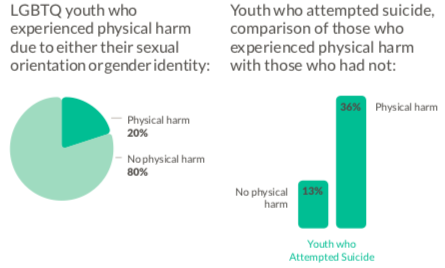The American Journal of Psychiatry published a study from Yale School of Public Health and the Karolinska Institute in Sweden touting the benefits of surgeries for gender dysphoria:
Gender identity surgeries include double mastectomy and phalloplasty for FtMs, and vaginoplasty and facial feminization for MtFs. They have now had to issue corrections indicating the study was flawed and shows no benefit.
The study, as others, indicates overall worse mental health and suicide risk for transgender people compared to the general population:
Results:
Compared with the general population, individuals with a gender incongruence diagnosis were about six times as likely to have had a mood and anxiety disorder health care visit, more than three times as likely to have received prescriptions for antidepressants and anxiolytics, and more than six times as likely to have been hospitalized after a suicide attempt. Years since initiating hormone treatment was not significantly related to likelihood of mental health treatment (adjusted odds ratio=1.01, 95% CI=0.98, 1.03). However, increased time since last gender-affirming surgery was associated with reduced mental health treatment (adjusted odds ratio=0.92, 95% CI=0.87, 0.98).
They found no evidence of benefits of hormones alone. They did report a “longitudinal association between gender-affirming surgery and reduced likelihood of mental health treatment.” The positive message about “gender-affirming surgeries” was widely cited by the media. Current media appears eager to promote pro-medical transition stories, even when it involves minors, as any critical commentary about these protocal is lacking in US media. Dr. Pachankis himself claimed in an interview:
No longer can we say that we lack high-quality evidence of the benefits of providing gender-affirming surgeries to transgender individuals who seek them.
However, the study is flawed and the data shows no benefits from these expensive surgeries that may have negative side-effects such as infection, loss of sexual function, and need for repeat vaginiplasty surgeries. After several letters to the editor criticized it, the journal redid the study’s statistical analysis and found the conclusions are wrong.
While the positive claims were reported in the media, some retractions have not been. Gender Health Query is sending out a request to media outlets who repeated the positive claims of this poorly done study whose authors may have been suffering from confirmation bias to correct the record. We are also asking the American Journal of Psychiatry why they continue to display this title prominently. It’s misleading. Notice the positive sounding title remains intact, but there is only a small link at the top mentioning that there are corrections to the article. Sometimes corrections are minor. That is not the case with this study. Does the AJP want to mislead the public? Because that will be the result based on this title. What are the reasons they did not retract the study altogether?
This study had a high quality, very large data set (2,600 transgender individuals diagnosed with gender incongruence between 2005 and 2015 versus all the rest of the Swedish population). It is one of the better data sets used in a study, with many studies on transgenderism being poor quality (ex- survey studies, convenience sampling, lost to follow-ups). It contricits the finding of the Cornell review And this analysis fails to show improvements in the mental health with hormone use and surgeries. That is significant given the huge increase in medicalized minors.
Most studies on outcomes for trans individuals are of poor quality in terms of research standards. Many studies indicate trans people have improved quality of life post-transition. Others indicate that long-term mental health outcomes are not good, calling into question the effectiveness in reducing suicide risk and improving mental health.
A list of “Letters to the Editor” and their response is listed under the published article:
35 Anckarsäter H, Gillberg C: Methodological shortcomings undercut statement in support of gender-affirming surgery. Am J Psychiatry 2020; 177:764–765Abstract, Google Scholar
36 Van Mol A, Laidlaw M, Grossman M, et al.: Gender affirmation surgery conclusion lacks evidence. Am J Psychiatry 2020; 177:765–766Abstract, Google Scholar
37 Curtis D: Study of transgender patients: conclusions are not supported by findings. Am J Psychiatry 2020; 177:766Abstract, Google Scholar
38 Malone W, Roman S: Calling into question whether gender affirming surgery relieves psychological distress. Am J Psychiatry2020; 177:766–767Abstract, Google Scholar
39 Landén M: The effect of gender-affirming treatment on psychiatric morbidity is still undecided. Am J Psychiatry 2020; 177:767–768Abstract, Google Scholar
40 Wold A: Gender corrective surgery promoting mental health in persons with gender dysphoria not supported by data presented in paper. Am J Psychiatry 2020; 177:768Abstract, Google Scholar
41 Ring A, Malone M: Confounding effects on mental health observations after sex reassignment surgery. Am J Psychiatry 2020; 177:768–769Abstract, Google Scholar
42 Bränström R, Pachankis JE: Toward rigorous methodologies for strengthening causal inference in the association between gender-affirming care and transgender individuals’ mental health. Am J Psychiatry 2020; 177:769–772Abstract, Google Scholar
Here is a list of URLs citing this study that now need correction:
https://www.bustle.com/p/affirming-peoples-gender-improves-trans-mental-health-a-study-says-19345160
https://www.jwatch.org/na50059/2019/10/11/gender-affirming-surgery-durably-improves-mental-health
https://www.medpagetoday.com/psychiatry/generalpsychiatry/82642
Here is a list of journal articles that referenced this study and quotes used:
Sevelius J.M., Gutierrez-Mock L., Zamudio-Haas S., et al. (2020). Research with Marginalized Communities: Challenges to Continuity During the COVID‑19 Pandemic, AIDS and Behavior, Volume 24, 2009–2012. https://doi.org/10.1007/s10461-020-02920-3
> Among our transgender and gender diverse staff and participants, delays in gender-affirming treatment, such as hormone injections and surgeries, due to the shutdown of clinics and delays in "elective" surgeries, can cause serious mental health issues, including depression, anxiety, and suicidality [16].
Wang Y., Pan B., Liu Y., et al. (2020). Health care and mental health challenges for transgender individuals during the COVID-19 pandemic, Lancet Diabetes Endocrinology, Volume 8, Issue 7, 565-565. https://doi.org/10.1016/S2213-8587(20)30182-0
> Besides access to health care, it is also important to highlight mental health issues of transgender individuals. Previous studies showed that gender-affirming surgery was associated with reduced mental health problems.4
Roque R.A. (2020). Transgender pediatric surgical patients—Important perioperative considerations, Pediatric Anesthesia, Volume 30, Issue 5, 520-528. https://doi.org/10.1111/pan.13845
> "Importantly, surgeries for transgender individuals are medically necessary procedures, proven to improve dysphoria, mental health, and quality of life,26, [29]-33 and should not be viewed as elective.14, 15"
Konrad, M., & Kostev, K. (2020). Increased prevalence of depression, anxiety, and adjustment and somatoform disorders in transsexual individuals, Journal of Affective Disorders, Volume 274, 482-485, https://doi.org/10.1016/j.jad.2020.05.074
Aldridge Z., Patel S., Guo B., et al. (2020). Long term effect of gender affirming hormone treatment on depression and anxiety symptoms in transgender people: A prospective cohort study, Andrology, published online 10 August. https://doi.org/10.1111/andr.12884
> "In contrast, Bränström and Pachankis [40] using the Swedish population register showed no significantassociation between the likelihood of accessing mental health treatment and time since initiation of GAHT.
"Flaherty, A.J., Sharma, A., Crosby, D. (2020). Should Gender-Affirming Surgery Be Prioritized During the COVID-19 Pandemic?, Otolaryngology–Head and Neck Surgery, Published June 30, https://doi.org/10.1177/0194599820939072
> A recent study found significantly reduced risk of mental health treatment in TGNC patients after receiving GAS but not HRT alone.13
Schvey, N.A., Klein, D.A., Pearlman, A.T., Riggs, D.S. (2020), A Descriptive Study of Transgender Active Duty Service Members in the U.S. Military, Transgender Health, first published 19 May 2020, https://doi.org/10.1089/trgh.2019.0044
> The finding that transmales, who were significantly more likely to have taken steps toward gender affirmation, presented with better mental health may provide further evidence supporting the effectiveness of gender-affirming treatments in ameliorating distress and improving quality of life.69,[70]
Surmaitis, R.M., Greenberg, M.R., Ebeling-Koning N.E., et al. (2020). Characteristics of Transgender Patient Cases Managed by a Toxicologist: an Analysis of the Toxicology Investigator's Consortium (ToxIC) Registry: January 2017–June 2019, J Med Tox, Published: 17 June 2020
> It would be helpful for further study to gather more information on whether patients have undergone surgical procedures or hormonal therapy because it has been shown that rates of suicidality and utilization of mental health services may differ based on transition-related medical interventions [20, 21].
Giraldi A. (2020). Mental health and gender dysphoria – why does it matter? Acta Psychiatrica Scandinavica, Volume 141, Issue 6, 483-485, https://doi.org/10.1111/acps.13182
> Though, some studies indicate that some of the increased risk of mental health problems persist, which may in part be related to internal and external factors (17-19).References
Bränström, R., Pachankis, J. (2019). Reduction in Mental Health Treatment Utilization Among Transgender Individuals After Gender-Affirming Surgeries: A Total Population Study. American Journal of Psychiatry, 77(8):727-734. doi.org/10.1176/appi.ajp.2019.19010080
Cornell University. (2018, March 26). What does the scholarly research say about the effect of gender transition on transgender well-being? Retrieved from https://whatweknow.inequality.cornell.edu/topics/lgbt-equality/what-does-the-scholarly-research-say-about-the-well-being-of-transgender-people/





































